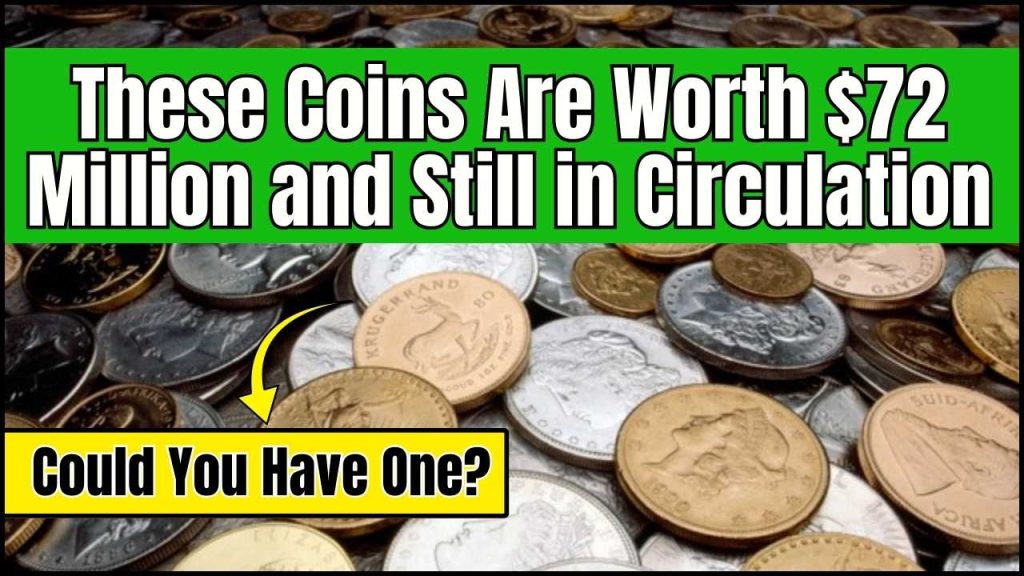Coins Are Worth $72 Million: Rare coins worth millions might sound like a myth, but some coins truly worth up to $72 million have shown up in everyday pockets and coin jars. If you’ve ever paid with spare change, raided an old piggy bank, or picked up an interesting-looking coin off the ground, you might want to take a second look—you could be holding a small fortune without even knowing it.

While most coins are worth only their face value, a select few are extremely rare due to minting errors, limited circulation, or historical significance. These coins may have been made decades ago, but they sometimes go unnoticed, quietly passing through generations of change hands. In this guide, we’ll break down the most valuable coins potentially still in circulation, how to identify them, and what to do if you think you have one.
Coins Are Worth $72 Million
| Feature | Details |
|---|---|
| Headline Coin Value | Up to $72 million (1913 Liberty Head Nickel + others combined) |
| Most Common Valuable Coins | 2008 undated UK 20p, 2012 Olympic 50p, 2004 Wisconsin Quarter |
| Highest Recorded Sale | 1933 Double Eagle sold for $18.9 million |
| Where to Find | Your pocket change, old piggy banks, coin jars, estate collections, flea markets |
| Official Resources | Royal Mint, US Mint, PCGS |
It might seem unbelievable, but rare coins worth thousands or even millions of dollars could still be hiding in plain sight. From the UK’s elusive undated 20p to America’s 1933 Double Eagle, these tiny treasures have turned everyday people into overnight millionaires. With a little knowledge, patience, and curiosity, you could join them. So, next time you’re sorting through loose change, take a closer look—your next coin could be your biggest payday yet.
Why Some Coins Are Worth Millions
Rare coins command massive value based on a few key traits that make them collectible or unique in the eyes of collectors and historians.
1. Limited Mintage or Minting Errors
Coins like the 2008 undated 20p in the UK or the 2004 Wisconsin Quarter with an extra leaf in the U.S. were minted with errors or in small batches. These mistakes make them incredibly desirable. The fewer the coins exist, the higher the value they can demand.
2. Historical Significance
Some coins were produced during pivotal historical periods, or were never intended for public release. The 1913 Liberty Head Nickel is a perfect example—it wasn’t authorized for production, and only five exist. Likewise, the 1933 Double Eagle was recalled and melted down, yet a few escaped destruction.
3. High Demand Among Collectors
The rarest coins attract a lot of attention in the numismatic community. When media coverage increases or a collector trend spikes, the value of certain coins can skyrocket. For instance, Olympic commemorative coins or coins with celebrity stories can fetch several times their original appraisal.
4. Condition and Rarity Combined
Even if a coin is rare, it’s the condition—graded from “poor” to “mint state”—that multiplies its worth. A well-preserved error coin could be worth 10 to 100 times more than a worn-down version.
Top 10 Valuable Coins That Could Be in Circulation
1. 2008 Undated 20p Coin (UK)
- Reason: Minting error; no date on either side.
- Potential Value: Up to £75
- Where Found: Circulated in everyday change for a short time.
- Official Info: Royal Mint Error Coin Guide
2. 2012 Olympic 50p Coins (UK)
- Reason: Low mintage commemorative sports series.
- Most Valuable: Football, Wrestling, and Judo
- Value: Up to £75 or more
- Collector Tip: Look for complete sets or rare sport variations.
3. 2004 Wisconsin State Quarter (US)
- Reason: “Extra Leaf” error on corn stalk.
- Value: $300 – $1,000 depending on condition and type (low or high leaf)
- Source: PCGS CoinFacts
4. 1969-S Lincoln Cent with Doubled Die Obverse (US)
- Reason: Dramatic doubling in words like “LIBERTY” and “IN GOD WE TRUST”
- Value: $10,000 to $40,000 or more
- Authenticity Note: Fakes exist—professional grading is essential.
5. 1970-S Small Date Lincoln Cent (US)
- Reason: Subtle difference in date design, hard to detect
- Value: $3,500 to $5,000
- How to Spot: Check the height of the “7” in “1970”—it’s level with the “0”
6. 1999 Wide “AM” Lincoln Cent (US)
- Reason: Unusual spacing between the letters A and M in “AMERICA”
- Value: Up to $600
- Where Found: Typically from circulation and unsearched rolls.
7. 1913 Liberty Head Nickel (US)
- Reason: Only 5 known to exist; unauthorized mintage
- Auction Price: Between $4.5 million and $5 million+
- Collector Fact: One was famously featured in a 1973 episode of Hawaii Five-O.
8. 1933 Double Eagle (US)
- Reason: Most were melted after recall; only a few survived
- Auction Price: $18.9 million in 2021
- Source: Smithsonian Institution
- Trivia: Legal disputes surrounded ownership for decades.
9. 1894-S Barber Dime (US)
- Reason: Only 24 minted; 9 are accounted for
- Value: Over $1.9 million
- Noteworthy Tale: One was allegedly spent on ice cream by a banker’s daughter.
10. 1976 Bicentennial Quarter Errors (US)
- Reason: Double dies, off-center strikes, and wrong planchet errors
- Value: Up to $3,000 or more
- Collector Tip: Look for thick rims and unusual coloring.
How to Check If You Have a Valuable Coin
Finding a valuable coin doesn’t require expert knowledge—just some basic steps and attention to detail.
Step 1 – Check Year and Mint Mark
The date and mint mark (usually found below the year) are key identifiers. U.S. coins will often have a D (Denver), S (San Francisco), or no mint mark (Philadelphia). UK coins typically won’t have mint marks.
Step 2 – Compare With Images
Use high-authority sites such as PCGS.com or NGCcoin.com to match images. Zoom in and study small details like lettering, spacing, or texture.
Step 3 – Look for Errors
Double dies (lettering appears twice), off-center strikes, and die cracks are some error types. Even missing design elements like date, mint mark, or part of an image can add value.
Step 4 – Get the Coin Appraised
If a coin seems rare or different, take it to a certified numismatist or submit it for grading.
- Trusted Grading Services: PCGS, NGC
What to Do If You Have a Rare Coin
1. Preserve the Coin
Always handle coins by the edges using gloves or soft cloth. Oils from your fingers can reduce its value. Never clean a coin—even gentle polishing can destroy its collectible value.
2. Get It Authenticated
Professional grading can confirm the authenticity, condition, and market value. Submit coins to PCGS or NGC for a certified slab.
3. Explore Auction Options
Selling rare coins through an auction can fetch the best prices due to bidding competition. Leading auction houses include:
- Heritage Auctions
- Stack’s Bowers
- GreatCollections
4. Keep Documentation
Always retain any paperwork, receipts, or provenance documents—especially if the coin was inherited or acquired through an estate.
Own a Kennedy Half-Dollar? It Could Be Worth $160,000! Check These 4 Rare Coins!
$450 Million For 3 Rare Dimes and Bicentennial Coins – Do You Own One?
These 6 Rare Coins Valued at $2 Billion Each – Do You Have One?
FAQs About Coins Are Worth $72 Million
Can I find million-dollar coins in my change?
While rare, it’s not impossible. Many high-value coins started as errors or limited releases and later gained value.
What should I do first if I suspect I have a rare coin?
Avoid cleaning it. Store it safely, research it using reputable sites, and seek a professional appraisal.
Where can I sell rare coins?
You can approach certified dealers, online auctions, or professional numismatic marketplaces.
What coins should I look for in the UK?
The undated 20p, Kew Gardens 50p, and Olympic 50p coins are among the most valuable in circulation.
How much can an error increase a coin’s value?
Depending on the type and rarity of the error, value can increase from a few pounds or dollars to several thousand.











